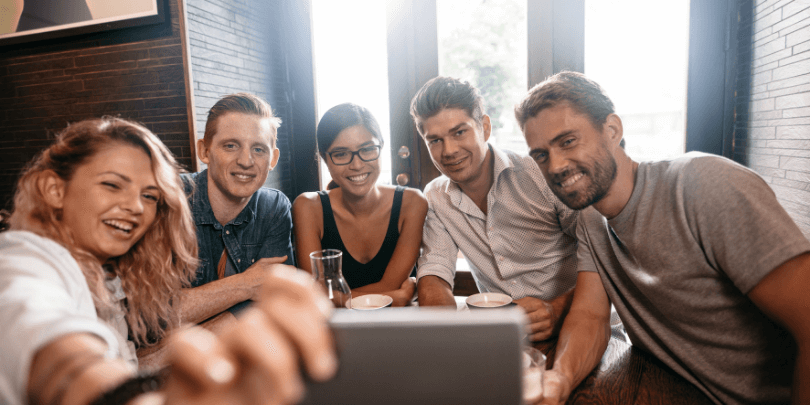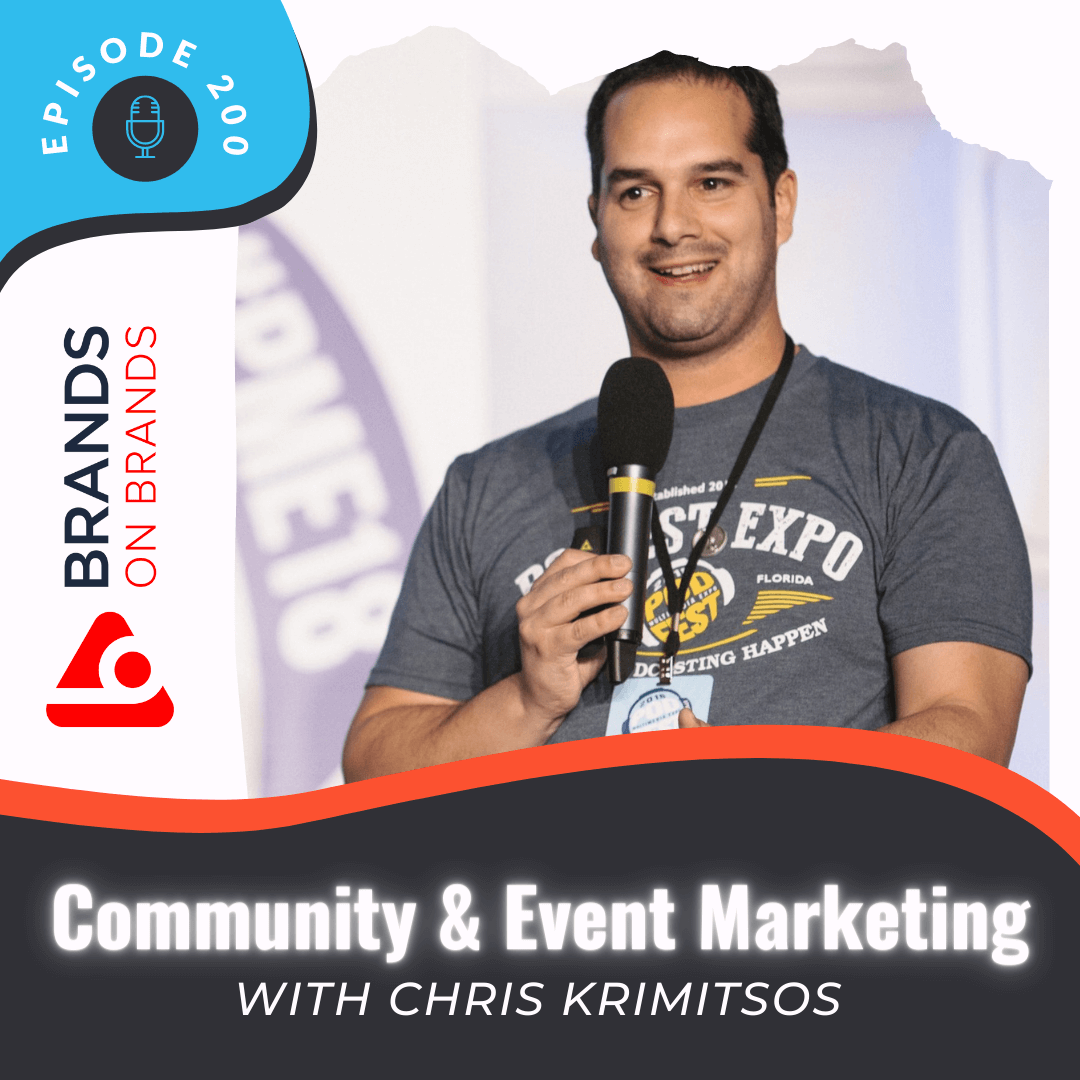Today we’re talking about creating community with our guest Chris Krimitsos. Chris is one of the best in the field at community building. This episode is for anyone looking to build a personal brand, but realize that it takes a community to build a brand, and it takes some impact to change lives. This man has done both.
Chris is a leading expert on podcasting and on-demand audio. He is the host of Podfest, an international podcasting conference attracting thousands of attendees from over 50 countries each year, and the longest-running continuous in-person podcasting event in the world. He holds the Guinness world record title for the largest attendance for a virtual podcasting conference in one week.
Chris also has two decades of experience and over 2000 live events under his belt with the world’s most influential voices in marketing, audio, and technology. They inspired his best-selling book Start Ugly, which if you haven’t checked it out, it’s an easy one-hour read, to inspire you, to get you going as an entrepreneur and influencer, and begin your creative journey.
You know me, I’m a big fan of content creators. Lots to bring to you today with information pulled out of Chris on how to do this yourself, how to get out there, and how to start your own event.
KEY INGREDIENTS TO CREATING COMMUNITY
Brandon Birkmeyer: Well, let’s start with this idea of creating community. What are the key ingredients? Let’s just start with some basic concepts for everyone out there.
Chris Krimitsos: You have to start with the very basics. We need to have either a shared interest or a shared belief system.
Most people don’t realize this, but when you look at associations, they either represent someone’s career. For example, you got your mortgage brokers, you got your doctors, you got your brand experts, your marketers, etc. All these different associations usually have their wheelhouse so people could self-identify.

Or you could create an event based on a belief system. So for instance, Podfest is based around podcasters as creators. But we’re expanding out of that to live streamers and YouTubers. We have different brands within that brand.
Another idea of a shared belief system would be people that are doing something good. For example, people used to go to local shops and buy stuff to support a local shop. These groups would pop up in support of that. That’s a group where people are looking to do good in the world together.
So there’s a common interest and their common interests could either be your shared interest/wheelhouse, or it could be a belief system. So that’s foundational. You can’t just create a group and say, show up to see how great I am.
CREATING COMMUNITY TAKES ON A LIFE OF ITS OWN
Brandon Birkmeyer: So it’s all about how you self-identify.
Chris Krimitsos: Yes, so please understand podcasting is a one-to-many platform. But to create a community out of a podcast, you’re creating what I would call a three-dimensional thing. The community members will create relationships outside the host. Now you have something that has legs that could have a much bigger impact because now the community is taking a life of its own.
But again, a lot of people are afraid of that because there’s a part of it that you can’t control. You have to create guardrails or boundaries or some rules, depending on what it is that you want your community to do or be. And that goes into community governance. You have to figure out what that is.
CREATING RULES FOR YOUR COMMUNITY
Everybody has different governance. For example, I know we’re all exposed to Facebook groups that have rules that say don’t spam. That’s a Facebook thing. You’re not allowed to spam in groups.
Brandon Birkmeyer: So it’s a basic construct. There need to be some guide rails, some understanding of what we are here to do, and what we understand are the rules of the group. Just some basic starting points so it isn’t just a free-for-all.
Chris Krimitsos: Correct. And then the last two things are education and relationships.
YOUR COMMUNITY WANTS EDUCATION AND RELATIONSHIPS
An educational piece allows us to say, I need to go there because I’m going to get something of value. Whether you go there virtually or in person, it doesn’t matter. You have to explain it to yourself, to your significant other, or to your family. They want to know why you are spending time away.

And the bigger benefit, if you have a really great community, is that you get to meet other amazing people. You can create synergies out of that. And those synergies are so unique to communities.
There are so many different things that you could get out of that besides just business or aligning yourself strategically with someone and their interests. Those are the ethereal benefits of bringing people together.
Brandon Birkmeyer: Yes, and I like to call that impact. Sometimes I don’t go to the conferences and the events or the communities to learn something. I sometimes just go because, to your point, there’s value that’s going to be derived in some other way. And it creates some kind of impact.
Maybe that thing that they’re saying is not educational to me, but it’s inspiring to me. For example, I’ll hear a story that makes me want to keep going, or that makes me think of how I’d like to contribute deeper into the community itself. I love the idea that we’re all gathering, we have shared interests or shared beliefs, and we have some rules, but also that there’s something happening that affects us, or that really causes us to grow in some way.
CREATING COMMUNITY CREATES BETTER RELATIONSHIPS
And then you talk about this idea of synergy when meeting new people. The common idea of networking has almost become a dirty word. I think people are looking for relationships, but what does a community bring to the table that allows people to build relationships differently?
Chris Krimitsos: When you self-identify and say, I want to be part of a community. You are actively going to be part of that community.
For example, a lot of times people will attend events by themselves. So now it’s like, oh my God, am I going to meet someone? It’s very much like a high school. It’s the first year of class for the people that are first-timers. Those relationships that they’re going to create in year one are probably going to be some of the most pivotal relationships that they’ll have for their lives in that field or in that community. You have to be very conscious that that’s a very precious moment when someone first raises their hand and says, I want to be part of what you got.
EMBRACE CREATING COMMUNITY AT EVERY STAGE AND SIZE
The one thing I will tell you, are two community guidelines that people won’t teach you. It’s not something you hear often. First, never apologize for the number of people that show up to your community. If it’s you and one other person, don’t apologize to that person that you should have had more people.

That’s like cardinal sin, in my book, to apologize. What you’re saying to that person is, it would have been more valuable if more people than you showed up. Or you could have 10 people and say, oh, I had a plan for 20. Now you’re telling the 10 that they’re not as valuable as 20. So we never want to put value over the individuals that raised their hand to show up.
And then if you’re doing a live event and you have 50 people confirmed, for example. And let’s say you didn’t charge, so it’s a free event. You’re starting out. That’s how I started out. Make sure to have about 25 chairs instead of 50. And then when you need to add chairs, add chairs. You do this because people do look at who and what is in the room. And if there are empty chairs, they see it and feel it. You want to make sure that it looks full because it creates different energy within an in-person event or community.
CONNECT WITH CHRIS KRIMITSOS
RESOURCES
Free Guide: Convert 1 Hour into 1 Month of Content
MORE ADVICE AND INTERVIEWS
Need A Podcast Coach? CLICK HERE to schedule a chat.
And don’t forget to leave a rating and review on Apple Podcasts.
Talk soon!
